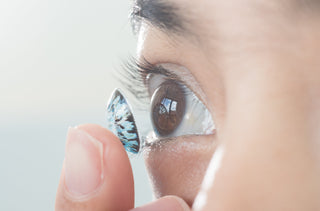The eye is one of the most fragile organs of the human body. Those of children are even more fragile and sensitive because they are growing and developing. Prolonged exposure to the sun or to digital screens that emit blue light, without protection may have negative effects on their vision and eye health. Here are four tips to make sure your children's eyes are well protected.
1. Make Sure They Wear Sunglasses
The sun’s UV light can cause permanent damage to the eye, short and long term, if exposed for long periods of time without protection. It is therefore important to encourage your child to wear sunglasses outdoors. To do this, choose a quality pair of sunnies that they like and will want to wear. If your child wears glasses, it might be a good idea to invest in a pair of prescription sunglasses.
At school, it can be more complicated for children to think about wearing their sunglasses. It is very likely that they leave them behind in their locker or in their school bag. Transition lenses are a great way to ensure that your child's eyes are protected from the sun's harmful rays at all times, even in the schoolyard. It is often during the summer that we tend to wear sunglasses, but it is equally important to wear them during winter because the sun's rays are reflected on the snow, which increases the glare. If your child's eyes are particularly sensitive to the sun, choose polarized lenses, which reduces glare on snow and water.

2. Try to Reduce Their Exposure to Blue Light
We hear more and more about the consequences of blue light. Children are exposed to digital screens like tablets and smartphones at a young age, and these are the greatest source of blue light after the sun. Some schools now use interactive whiteboards, so children spend most of their day in front of a screen. The blue light emitted by the screens can cause headaches LINK and eyestrain LINK, as well as possibly affecting their vision in the long term. The best advice your optometrist can give you is to reduce the use of electronic devices. For example, you can give your child a maximum time per day for tablet use, and you could also encourage them to go play outside. The use of digital screens is also to be avoided two hours before going to sleep, because blue light disrupts the circadian rhythm, the sleep-wake cycle. To reduce the effects of blue light, choose a lens coating that contains a blue light filter for your child, such as SeeCoat Blue UV or SeeCoat Blue Premium. If your child does not wear glasses, you can also get TrueBlue glasses. These are non-prescription glasses that filter blue light. They are specially designed to be worn in front of screens.
3. Make Sure They Wear Sports Goggles
If a ball hits a child’s head, it can easily hurt their eyes. Protective goggles are recommended for certain sports, such as soccer or baseball. They help reduce the risk of injuries, and also prevent damage to your child's everyday glasses if they get hit. Sports glasses are available with or without a prescription. As they are strong and shock resistant, they allow your little ones to have fun while remaining safe.
Does your child like to swim? Why not encourage him or her to wear swimming goggles, both in the pool and in the lake. Swimming goggles protect the eyes against bacteria in water and chlorine, which can irritate eyes and make them dry.
4. Be Alert to Avoid Accidents
It is not uncommon for optometrists to receive an emergency call to see a child who has accidentally been injured. To reduce the risk of injury, encourage your child to avoid behaviours that put their eyes at risk. For example, remind them to keep sharp objects, such as scissors away from their own eyes and those of others around them. If your child gets a sharp blow on the eye, have it checked by the optometrist as soon as possible. Also, make sure to store products that may cause damage to the eye such as spray paint or cleaning products in a safe place. Does your child play with ‘’projectile toys’’? Teach him or her to use them with care and not to direct them towards other people.
And, if ever an accident occurs and your child’s glasses break, don’t worry, you are covered by our No Matter What Guarantee! IRIS will repair or replace your frame if it breaks, no matter what the reason, at no cost within one year of purchase and at 50% off your original frame purchase price if it breaks within the second year.
Would you like to buy glasses for your child that protect against impacts, sunlight or blue light? Make an appointment at an IRIS store near you. Our eye care professionals will be happy to guide you to the best options to protect the eyes of your children.





















































